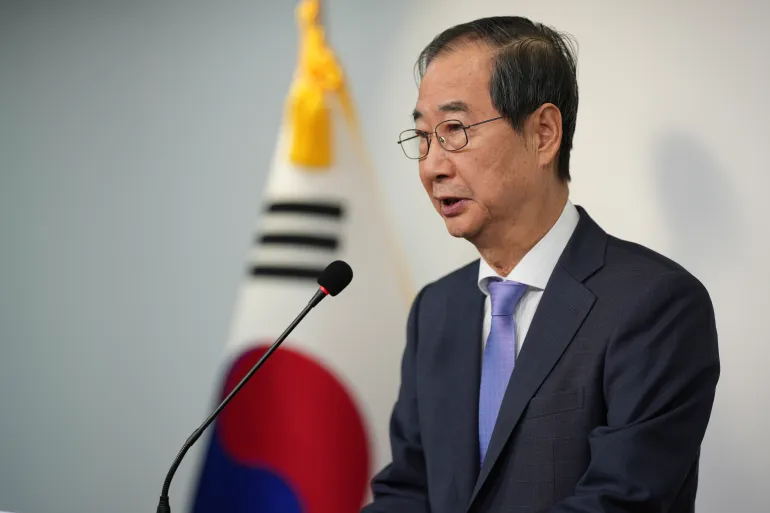
South Korea in Crisis: Acting President Han Duck-Soo Impeached Amid Yoon’s Trial
Introduction
South Korea finds itself embroiled in a profound political crisis as the impeachment of Acting President Han Duck-soo follows closely on the heels of President Yoon Suk Yeol’s suspension from office. This unprecedented chain of events has left the nation in a state of constitutional uncertainty, raising questions about governance, judicial integrity, and democratic stability.
This article explores the context, legal implications, and public sentiment surrounding this political turmoil, along with its potential impact on South Korea’s future.
(Facebook: Like, X: Follow, Telegram: Join us)
The Root of the Crisis: Yoon Suk Yeol’s Impeachment

The crisis began on December 14, 2024, when South Korea’s National Assembly impeached President Yoon Suk Yeol, citing allegations of constitutional violations and abuse of power. The tipping point was Yoon’s brief declaration of martial law earlier in the month, a move that was widely condemned as an overreach of executive authority.
While the martial law decree was overturned within hours by the Assembly, it left a lasting stain on Yoon’s presidency. Opposition lawmakers accused him of undermining democratic institutions and violating the constitution. The impeachment was passed with overwhelming support in the Assembly, where opposition parties hold a majority.
Han Duck-Soo as Acting President

Following Yoon’s impeachment, Prime Minister Han Duck-soo assumed the role of acting president, as stipulated by South Korea’s constitution. However, his tenure was fraught with challenges from the start.
One of the most contentious issues during Han’s brief time in office was his refusal to appoint three justices to the Constitutional Court. These appointments were seen as critical to adjudicating President Yoon’s impeachment trial. Han argued that such significant decisions should be postponed until political consensus could be achieved, a stance that infuriated opposition lawmakers who viewed it as an obstruction of justice.
Impeachment of Han Duck-Soo
On December 27, 2024, less than two weeks after assuming the presidency, Han Duck-soo was impeached by the National Assembly. The motion passed with a 192-0 vote, reflecting deep opposition to his handling of the Constitutional Court appointments.
Opposition leaders accused Han of dereliction of duty and jeopardizing the constitutional process. In their view, Han’s refusal to make the necessary judicial appointments delayed the impeachment proceedings against Yoon and risked plunging the country into deeper political chaos.
Legal Implications and the Constitutional Court

South Korea’s Constitutional Court now faces the daunting task of reviewing both impeachments — first of Yoon and now of Han. The court, which requires a unanimous decision from its six sitting justices to finalize a presidential removal, is operating with three vacancies due to the unresolved judicial appointments.
This unusual situation has raised concerns about the integrity and efficiency of the judicial process. Legal experts warn that the absence of a full bench could delay rulings and further erode public trust in South Korea’s democratic institutions.
Interim Leadership: Finance Minister Choi Sang-Mok

In the wake of Han’s impeachment, Finance Minister Choi Sang-mok has stepped in as interim leader. However, his appointment has done little to ease the nation’s concerns.
Choi’s immediate priorities include maintaining economic stability and ensuring continuity of governance. Yet, the rapid succession of leadership changes has left many questioning whether South Korea can effectively navigate its mounting domestic and international challenges.
Economic and Diplomatic Repercussions
The political crisis comes at a precarious time for South Korea. Domestically, concerns about economic instability have grown, with opposition leaders warning that the turmoil could trigger a financial crisis. South Korea’s stock market has shown increased volatility, and business leaders have called for swift resolution to restore investor confidence.
On the international stage, South Korea faces heightened tensions with North Korea, ongoing trade negotiations with key partners, and its role in regional security alliances. The leadership vacuum risks undermining South Korea’s credibility and weakening its position in global diplomacy.
Public Sentiment and Protests

The dual impeachments have sparked widespread protests across South Korea. Citizens from all walks of life have taken to the streets, demanding accountability and the restoration of democratic norms.
Public opinion on the crisis is sharply divided. Many view Yoon’s impeachment as a necessary step to uphold constitutional governance, while others see the opposition-led Assembly’s actions as politically motivated. Han Duck-soo’s impeachment, however, has drawn broader criticism for deepening the leadership vacuum and prolonging the nation’s instability.
The Opposition’s Role in the Crisis
The Democratic Party of Korea, which leads the opposition and holds a majority in the National Assembly, has been a driving force behind both impeachments. While their actions are rooted in legal and constitutional frameworks, critics accuse them of exploiting the crisis for political gain.
Proponents argue that their efforts are essential to safeguarding South Korea’s democracy, particularly in the face of alleged executive overreach by Yoon. However, the opposition’s dominance in the Assembly raises questions about the balance of power and the potential for partisan gridlock.
International Reactions
South Korea’s allies, including the United States, Japan, and the European Union, have expressed concern over the political turmoil. While foreign governments have refrained from direct interference, they emphasize the importance of a swift and peaceful resolution to ensure regional stability.
North Korea has seized the opportunity to criticize its southern neighbor, portraying the crisis as evidence of democratic dysfunction. This rhetoric adds another layer of complexity to an already tense inter-Korean relationship.
FAQs
What led to President Yoon Suk Yeol’s impeachment?
Yoon was impeached after briefly imposing martial law, which was widely condemned as unconstitutional. The National Assembly accused him of abusing executive power and undermining democratic institutions.
Why was Acting President Han Duck-Soo impeached?
Han Duck-soo was impeached for refusing to appoint three justices to the Constitutional Court, a decision seen as obstructing the impeachment trial of President Yoon.
Who is leading South Korea now?
Finance Minister Choi Sang-mok has stepped in as interim leader following Han’s impeachment.
What are the implications of the Constitutional Court vacancies?
The lack of a full bench complicates the court’s ability to rule on the impeachments, potentially delaying resolutions and exacerbating the crisis.
How has the public reacted?
The dual impeachments have sparked nationwide protests, with citizens divided on whether the actions were necessary to uphold democracy or driven by partisan interests.
What are the international implications?
The crisis risks undermining South Korea’s economic stability and diplomatic credibility, particularly in its dealings with North Korea and global allies.
A Test of South Korea’s Democracy
The simultaneous impeachments of President Yoon Suk Yeol and Acting President Han Duck-soo mark an unprecedented chapter in South Korea’s political history. The nation now stands at a crossroads, grappling with a leadership vacuum, judicial challenges, and growing public discontent.
The Constitutional Court’s decisions in the coming weeks will be pivotal, not only in resolving the current crisis but also in shaping the future of South Korea’s democracy. For now, the nation waits, hopeful for a resolution that upholds its constitutional principles and restores stability.
Do Follow For More News : DailyForesight



